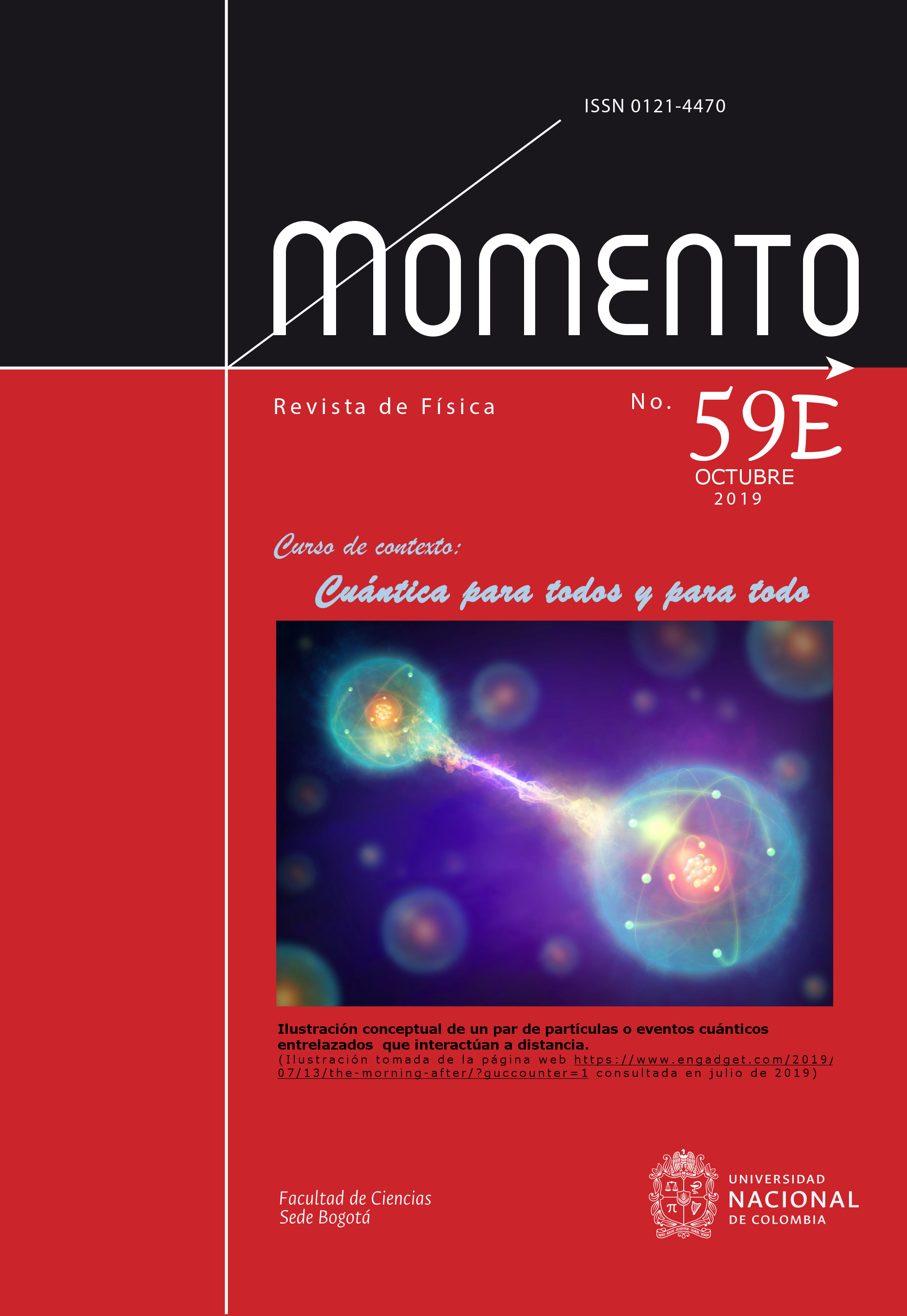QUANTUM THEORY AND THE SOCIAL SCIENCES
TEORÍA CUÁNTICA Y CIENCIAS SOCIALES
DOI:
https://doi.org/10.15446/mo.n59E.81645Keywords:
Quantum physics, social and human sciences, epistemology, complexity. (en)Física cuántica, Ciencias sociales y humanas, Epistemología, Complejidad. (es)
Downloads
There is a solid growth of quantum theory in that there is quantum physics, quantum chemistry, quantum biology, and a robust technology based on quantum behaviors and effects - to name but the most solid examples of the development and enhancement of quantum science. Quantum science is by and large the most robust theory, ever. However, to date there is a gap between quantum physics and the social sciences, for very little has been said about their interplay. This paper discusses the importance of a relationship between quantum science and the social sciences, and the entailment of such a relation. It offers a brief state-of-the-art, and discusses the very significance of quantum social science.
Asistimos a un sólido crecimiento de la teoría cuántica dado que existe la física cuántica, la química cuántica, la biología cuántica, y tecnologías robustas basadas en comportamientos y efectos cuánticos - para mencionar los ejemplos más sólidos del desarrollo y profundización de la ciencia cuántica. La ciencia cuántica es de lejos la teoría más robusta jamás habida. Sin embargo, a la fecha, existe un abismo entre la ciencia cuántica y las ciencias sociales, ya que muy poco se ha dicho sobre esta relación. Este artículo discute la importancia de las relaciones entre la ciencia cuántica y las ciencias sociales y las implicaciones de esa misma relación. Se ofrece un estado-del-arte y se discute el significado de las ciencias sociales cuánticas.
References
Diederik, S. Aerts, and C. de Ronde, Probing the Meaning of
Quantum Mechanics (Worl Sci, 2014). Quantum Theory And The Social Sciences. 57.
J. Anders and K. Wiesner, Chaos (Woodbury, N.Y.) 21 (2011).
D. A. Grandy, Everyday Quantum Reality (Indiana University
Press, 2010).
A. Garritz, "Teaching the philosophical interpretations
of quantum mechanics and quantum chemistry through
controversies," (2013).
P. A. Heelan, 4, 127 (1995).
Zizek, Less than nothing. Hegek ad the Shadow of Dialectcal
Materialism (2013).
T. Lawson, Camb J Econ 36, 345 (2012).
A. Wendt, Quantum Mind and Social Science: Unifying
Physical and Social Ontology. (Camb U Express, 2015).
S. Crasnow, Springer Link , 25:313 (2016).
D. Aerts, J. Broekaert, L. Gabora, and S. Sozzo, Front Psychol
, 577 (2016).
Bawden, L. Robinson, and T. Siddiqui, J Assoc Inf Sci Tech
, 437 (2015).
J. Camparo and L. B. Camparo, The Analysis of Likert Scales
Using State Multipoles: An Application of Quantum Methods
to Behavioral Sciences Data, Vol. 38 (J Educ Behav Stat, 2013)
pp. 81-101.
C. P. Gonccalves, "Quantum cybernetics and complex quantum
systems science: A quantum, connectionist exploration", in:
Neuroquantology," (2015).
A. Khrennikov, 60, 89 (2015).
A. Wichert, Plos One 11, 1 (2016).
I. M. Danah Zohar, The Quantum Society. Mind, Physics, and
a New Social Vision (1995).
S. G. Karsten, "Quantum theory and social economics:
The holistic approach of modern physics serves better than
newton's mechanics in approaching reality", in: The american
journal of economics and sociology." (1990).
E. E. Haven, Front Psychol 6, 1513 (2015).
K. A. Haven, E., Quantum Social Science (Camb U Press, 2013).
A. Khrennikov and E. Haven, AIP Conference Proceedings 889
(2007), https://aip.scitation.org/doi/abs/10.1063/1.2713471.
J. J. Wayne., "Human behavior paradox and a social science
interpretation of quantum mechanics," (2014).
T. Sorensen, (2011).
C. Wolf-Meyer M., Cochran, Sage J 15, 407 (2015).
P. Khrennikova, Evolution of Quantum-Like Modeling in
Decision-Making Processes (2012).
H. Wu, Quantum Mechanics Helps Agents Combat Bad"
Social Choice Rules, Vol. 9 (2011) pp. 615{623.
T. S. Smith, Geoforum 71, 5 (2016).
A. Arida, Quantum City (Architectural Press, 2002).
D. L, Alexandria Quartet (Penguin, 1991).
V. Bonta, Flight: A Quantum Fiction Novel (Meridian House,
.
E. Haven, A. Khrennikov, and T. Robinson, Quantum Methods
in Social Science (World Sci, 2017).
W.Wedin, "The unity of continuum: Relativity and alexandria
quartet." (1971).
C. Maldonado, Le Monde Diplomatique, , 34 (2017).
B. L. Berg and H. Lune, Qualitative Research Methods for the
Social Sciences. (pearson, 2011).
B. Somekh and C. Lewin, Research Methods in the Social
Sciences. (Sage Publications, Ltd., 2004).
C. E. Maldonado, "Complejidad de las ciencias sociales. y de
las otras ciencias y disciplinas." (2016).
How to Cite
APA
ACM
ACS
ABNT
Chicago
Harvard
IEEE
MLA
Turabian
Vancouver
Download Citation
License
Copyright (c) 2019 MOMENTO

This work is licensed under a Creative Commons Attribution-NoDerivatives 4.0 International License.
Those authors who have publications with this journal, accept the following terms:
a. The authors will retain their copyright and will guarantee the publication of the first publication of their work, which will be subject to the Attribution-SinDerivar 4.0 International Creative Commons Attribution License that permits redistribution, commercial or non-commercial, As long as the Work circulates intact and unchanged, where it indicates its author and its first publication in this magazine.
b. Authors are encouraged to disseminate their work through the Internet (eg in institutional telematic files or on their website) before and during the sending process, which can produce interesting exchanges and increase appointments of the published work.




















